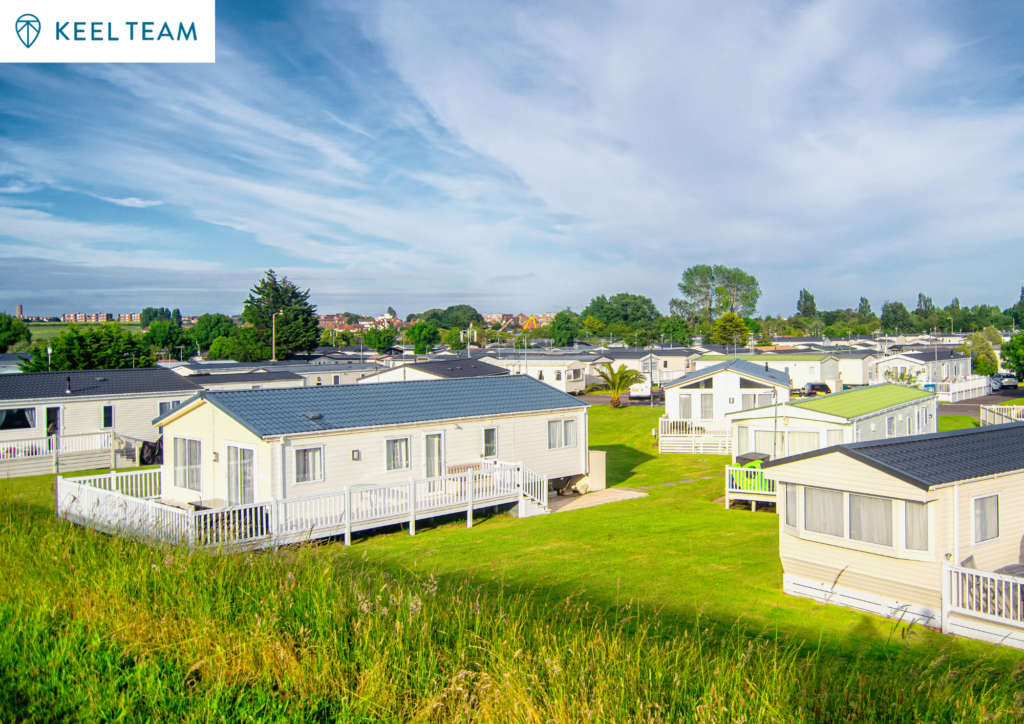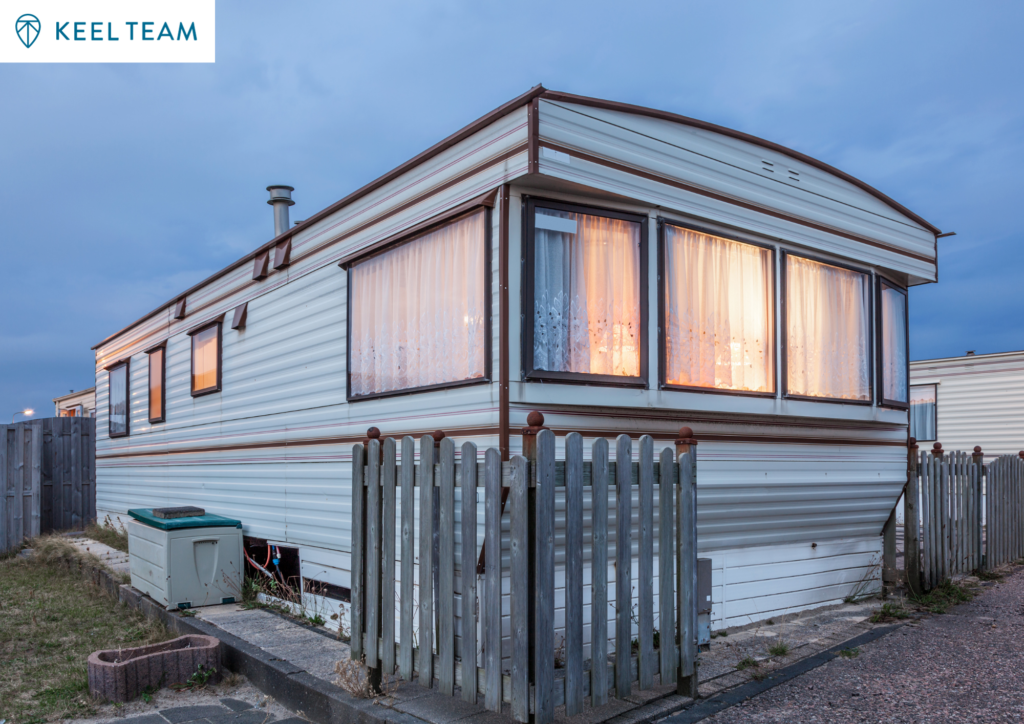Various Financing Options Available for Mobile Home Park Investments
-
 Tristan Hunter - Investor Relations
Tristan Hunter - Investor Relations
Mobile home park investments have become an increasingly enticing investment opportunity, driven by the growing demand for affordable housing, and other various factors mentioned in this blog. The choice of financing method plays a pivotal role in the success of your mobile home park venture. In this blog post, we will explore various financing options available for mobile home park investments, beginning with an introduction to each option and touching on their typical pros and cons. Furthermore, we will also touch on the different methods for getting a down payment together, and the strategies we employ for our mobile home park investments at Keel Team.
Let’s jump right in!

Seller Financing
Seller financing, often referred to as owner financing or a “seller note”, is a straightforward arrangement where financing is provided by the seller and is included in the purchase price. This can be an ideal option for those with limited access to traditional financing, as the terms are often negotiable, and it can offer more flexibility compared to conventional lending sources.
In general, loan terms vary from 50-60% LTV, usually with a 6-8% interest rate if the seller is prepared to agree to a 3-10 year payment period before being paid in full.
Pros:
- Easy to qualify
- Non-recourse
- Fast closing
- Lower down payments
Cons:
- Limited availability: Not all sellers are open to financing, limiting your options. Most mom & pop owners are not aware of the benefits of seller finance therefore it may require education in the matter without coming across as too pushy.
- Potentially higher interest rates: Sellers might charge higher interest rates than traditional lenders.
- Incomplete control: Sellers may retain control until the property is paid in full.
- Be careful of the seller finance trap.
Local Bank/Credit Union
Local financial institutions, including community banks and credit unions, provide traditional commercial loans for mobile home park acquisitions.
In many cases, banks typically restrict their lending activities to a specific geographic area, primarily focusing on local borrowers to offer them comprehensive banking services. Standard loan conditions often include 3-5 year periods, LTV ranging from 60% to 75%, and an amortization period spanning 15-25 years.
Pros:
Local lenders may be more accommodating when it comes to properties with a higher percentage of park-owned homes. While the preference for most lenders is to have 90-100% of income from “pad rental” and fewer than 20% “park-owned homes,” some banks can work with properties where 30-40% are park-owned. While banks and credit unions offer the advantage of low prepayment penalties, this could mean a shorter fixed-rate period in return. A personal guarantee is typically a standard requirement, although some banks might consider a partial guarantee based on the LTV. Additionally, loan fees are often more budget-friendly than those associated with non-recourse loans.
Cons:
Interest rates for these property types can often be relatively elevated. When it comes to financing for manufactured home communities, banks tend to favor amortization periods of 15 to 20 years, which can potentially constrain your expected proforma for the property’s cash-on-cash return. Furthermore, the fixed interest rate might be limited to a 3, 5, or possibly a 7-year duration. Additionally, bank financing processes may occasionally involve extended timelines for underwriting and completion.
At Keel Team, we first look to acquire our mobile home parks through local bank financing, usually with around 75% LTV. Andrew usually signs recourse on the loan. We usually look for heavy value-add projects with a lot of potential upside. Through infill, raising rents and billing back utilities, we typically increase the value of our mobile home park investments, stabilize our mobile home parks at a 10 cap and meet the requirements for agency debt – which we look to secure as soon as possible. The goal is to refinance our mobile home park investments with longer-term periods, usually with best in class financing terms through Fannie Mae or Freddie Mac.
National/Regional Banks
National bank financing for mobile home park investments typically offers loan terms ranging from 10 to 30 years, competitive interest rates, and LTV ratios of 65% to 80%. The recourse nature of the loan can vary, with some banks requiring a personal guarantee (recourse), while others may offer non-recourse loans, which limit personal liability. Non-recourse loans often require more stringent underwriting criteria and a higher down payment but provide reduced personal risk in case of default. It’s crucial to understand that specific terms and conditions may vary among national banks, so conducting thorough research and consulting with financial advisors is advisable before pursuing mobile home park investment financing.
Pros:
- Competitive Rates: National banks often offer competitive interest rates, which can result in lower financing costs over the life of the loan.
- Flexible Terms: With loan terms typically ranging from 10 to 30 years, you have the flexibility to choose a repayment period that suits your investment strategy and cash flow needs.
- Availability: National banks have a wide presence, making it easier to find a financing solution for your mobile home park investment in various locations.
- Larger Loan Amounts: National banks can often provide larger loan amounts, allowing you to invest in more substantial properties.
- Professional Expertise: National banks have experienced lending professionals who can guide you through the financing process and offer valuable insights into the mobile home park investment industry.
Cons:
- Recourse Requirements: Some national banks may require a personal guarantee, making you personally liable for the loan. This can put your personal assets at risk in the event of default.
- Stricter Underwriting: Non-recourse loans, which limit personal liability, often come with more stringent underwriting criteria, including higher down payment requirements and stricter property evaluation.
- Regulatory Compliance: National banks are subject to federal regulations, which can result in a potentially lengthier and more paperwork-intensive loan approval process.
- Less Personalized Service: As larger institutions, national banks may provide less personalized customer service compared to local or regional lenders.

Conduit Lending:
Conduit lending is a financing method tailored to substantial mobile home park developments. This avenue involves bundling multiple loans into securities that are then sold to investors, typically resulting in more competitive interest rates.
Pros:
- Suitable for large projects
- Potential for lower, more competitive interest rates
- Assumable
- Non-recourse
Cons:
- Complex process: Conduit lending can involve intricate structures and requirements, making it less accessible for some investors.
- Strict eligibility criteria: Larger projects necessitate meeting specific criteria and may require substantial experience.
- Bigger loan amounts, usually greater than $1-2 million.
Agency Financing:
Agency loans are offered by government-sponsored entities such as Fannie Mae and Freddie Mac. They cater to multifamily housing projects, including mobile home parks. These loans are known for their favorable terms, making them an attractive option for those who meet the eligibility criteria.
Pros:
- Non-recourse
- Most competitive rates
- Different fixed rate terms
- Lower legal fees
- You can refinance annually if you want to, up to 70% LTV.
Cons:
- Eligibility requirements: These loans have eligibility criteria that must be met.
- Lengthy approval process: The application process for agency loans can be lengthy.
- Typically work with less populated markets.
Here are some of the main requirements to qualify a mobile home park for agency debt, however these may vary based on the property and market:
- Addressing Deferred Maintenance
- Occupancy above 90%
- Park Owned Homes (POH’s) below 25%
- Removing hazards like Hitches from the mobile homes, unlevel sidewalks or unpainted speedbumps
- 2 parking spots per lot
- Paving all road surfaces
At Keel Team, the main focus of our business plan is qualifying our mobile home park investments with long-term Agency Debt through Fannie Mae/Freddie Mac (best in class financing terms), usually with 60% LTV. We then look to refinance our mobile home parks every 10 or so years after that, and hold them for potential long-term cash flow.
Check out the Southeast Michigan Case Study, a mobile home park portfolio we recently refinanced using non recourse, long-term Agency Debt through Fannie Mae. This project hit annual cash on cash returns of 21.04% as a whole, and returned all of the investors’ capital within a two year time frame!

HUD (U.S. Department of Housing and Urban Development)
The U.S. Department of Housing and Urban Development (HUD) offers a variety of loan programs that can be highly beneficial for mobile home park acquisitions and developments, particularly those with a strong affordable housing component. HUD loans often come with flexible terms and competitive interest rates.
Pros:
- Up to 40 year fixed terms
- Up to 97% LTV
- Low down payment
- Non-recourse
Cons:
- Complex application process: HUD loans can involve a detailed and time-consuming application process.
- It usually takes 6 months – 1 year to be approved. It is almost impossible to obtain HUD financing these days.
- Stringent eligibility: Eligibility criteria must be met to qualify for HUD financing.
Loan Brokers
Loan brokers are industry professionals who specialize in connecting borrowers with suitable lenders. They provide expert guidance, helping investors navigate the complex financing landscape and identify the most advantageous loan options for their specific projects.
Pros:
- Expertise: Loan brokers possess industry expertise, helping you navigate the complex financing landscape.
- Access to diverse options: Brokers can connect you with various lenders, increasing your chances of finding the best deal.
- Paid upon performance
- Better rates and terms
- Shortcuts the learning curve
Cons:
- Fees: Loan brokers typically charge fees for their services, which can increase your overall financing costs.
- Potential for conflicts of interest: Brokers may have relationships with specific lenders, potentially influencing their recommendations.

What About the Down Payment?
There are a few ways in which you can obtain the down payment for the financing options mentioned above. How you go about raising the capital is entirely up to you and so you should find the most efficient and cost effective solution for you. Here a few ways to obtain a down payment:
- Savings/Checkings
- Home Equity
- Credit Card
- Self-Directed IRA Funds
- Relatives
- JOBS Act: Regulation D Rule 506(b) & 506(c) Offerings
- Partners
- Cash-flow from flipping other mobile home parks
At Keel Team, we typically raise funds through Reg. D Rule 506(b) offerings, which is commonly referred to as 506(b) syndications. We usually use this method to raise funds from our limited partner investors, which is then used for the down payment on our Local Bank Loan and the CapEx improvements for our mobile home park investments. Check out our recent blog post for more information on these types of syndicated investments: What to Know About Investing in Syndications.
Which Financing Option is the Best?
The “best” financing option varies depending on your specific circumstances and investment goals. Seller financing offers flexibility but may be limited. Local banks and credit unions provide local expertise but can be stringent in their requirements. National/regional banks cater to larger projects but with stricter criteria. Conduit lending suits larger developments but can be complex. Agency loans and HUD offer favorable terms but have eligibility requirements, HUD financing almost being impossible to obtain these days. Loan brokers provide expert guidance but come with fees, which could eat into your income.
Ultimately, the choice should align with your investment strategy, financial capacity, and goals. For smaller, flexible investments, seller financing or local banks may be suitable. For larger projects, national/regional banks or conduit lending might be a better fit. It’s essential to consult with financial experts or real estate professionals to make an informed decision based on your unique circumstances.
Learn more about mobile home park investing.
Interested in learning more about mobile home park investing? Get in touch with us today to find out more.
Are you interested in learning more about mobile home park investing and the various financing options that are available? Reach out to us to learn everything mobile home park investments and the potential benefits of investing in this asset class!
Disclaimer:
The information provided is for informational purposes only and should not be considered investment advice, nor a guarantee of any kind. There are no guarantees of profitability, and all investment decisions should be made based on individual research and consultation with registered financial and legal professionals. We are not registered financial or legal professionals and do not provide personalized investment recommendations.

Tristan Hunter - Investor Relations
View The Previous or Next Post
Subscribe Below 👇





